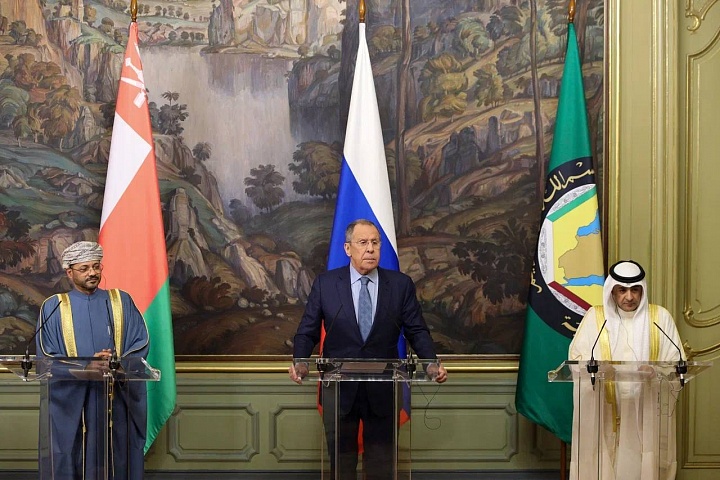Foreign Minister Sergey Lavrov’s statement and answers to media questions during a joint news conference with Foreign Minister of the Sultanate of Oman Badr Albusaidi and GCC Secretary General Jasem Albudaiwi, Moscow, July 10, 2023
Ladies and gentlemen,
The 6th round of the Russia-GCC strategic dialogue has ended.
The consultations are an effective mechanism for coordinating our countries’ actions in the interest of strengthening regional security and stability and expanding economic interaction and humanitarian ties.
With regard to “material” cooperation, we noted a significant increase in bilateral trade and economic numbers over the 12 years the Russia-GCC format has been in existence. The total trade exceeded $11 billion in 2022, up from $3.7 billion in 2011. Both sides emphasised their interest in expanding and diversifying economic ties. We agreed to use all available opportunities and reserves, including the Intergovernmental Commissions on Trade and Economic Cooperation facility, which we have with almost all the GCC member countries.
We discussed the international agenda at length and emphasised the lack of alternative to respecting the key principles of country-to-country communication and law that are enshrined in the UN Charter. We see this as an essential basis for resolving crises throughout the Middle East,
We agreed that in order to maintain lasting and sustainable stability in the Gulf region, it is important to overcome differences through the efforts of the countries of the region themselves with the involvement of constructively minded external partners.
We welcome the steps towards normalising Arab-Iranian relations. As you may be aware,
We lauded the efforts to promote the political process in
We have discussed at length the situation in and around
We devoted considerable attention to the situation in
We also touched upon the situation concerning the
Following today’s meeting, we adopted a joint statement and a joint action plan for
On the whole, we see strategic dialogue as a good option for providing an additional impetus to business-like cooperation between
We are expecting the strategic dialogue to continue next year when
Question: How would you describe relations between
Sergey Lavrov: First of all, I would like to say that we have already discussed this issue in great detail today. In short, this amounts to friendly and partner-like relations and a striving to formulate consensus-based common approaches towards any issues under discussion. Today’s meeting has confirmed that we always honestly set forth our positions to each other. At the same time, none of us seeks to interfere in relations between any state present here and third parties. I believe that this is how they differ from numerous other mutual ties that, unfortunately, are not equitable in this world.
Question: VTB Head Andrey Kostin suggested creating an alternate international settlement depository hub in one of the
Sergey Lavrov: There are currently many initiatives regarding this matter because the dollar has discredited itself and proved its unreliability as the main reserve currency. It showed that the issuing country, if it decides to punish someone, can take advantage of its position without blinking. Therefore, many countries are thinking of ways to avoid such influence and reduce their dependence on those who show their biased, egotistic geopolitical stance.
The only proposal that you mentioned was voiced by President of Brazil Luiz Inácio Lula da Silva. He suggested considering the possibility of creating a single currency for Latin America and the
There are other similar ideas. Experts have different opinions on the possibility of creating a single currency and settlement hubs, but all of them who think long-term strive to facilitate payment mechanisms, if not the creation of a single currency, that will protect all participants from arbitrary treatment by external players. I think it is a healthy process.
Question: Against the backdrop of talks about the possible extension of the grain deal, can there be agreements with better terms? To what extent are the Arab countries ready to take part in it given that
Sergey Lavrov: What do you mean by better terms? It was a package deal proposed by UN Secretary-General António Guterres. The terms of this deal are known. The Ukrainian part was being implemented. But everyone has long understood that the deal has turned into a commercial project. Less than three percent (we have spoken about it repeatedly) of the total volume of grain exported from Ukrainian ports goes to the poorest countries listed by the World Food Programme. These are the states for the benefit of which António Guterres promoted the initiative, which was approved.
Not a single provision from the Russian part of the deal was implemented. For many months, we have been hearing from the representatives of the UN Secretariat, the Secretary-General and his deputies in charge of the deal that they “are putting in enormous efforts,” are doing their best and will act even faster and more efficiently. These “enormous efforts” have not yielded any results so far. I do not know how it is possible to improve something that does not exist.
As for our export capacities, the grain and food market forecasts have been published recently, which say that our exports will grow steadily. President Vladimir Putin and Minister of Agriculture Dmitry Patrushev spoke about it. We continue to sell our grain like we did before and are fulfilling all of our obligations.
We said today that we are ready to meet the demand of our Arab partners, including the additional demand. There are no obstacles to that, and no new terms are needed that would depend on those who fail to fulfil their obligations.




